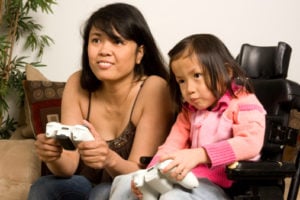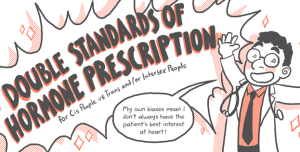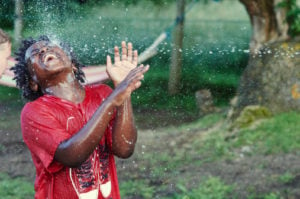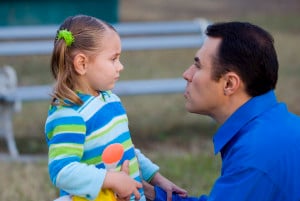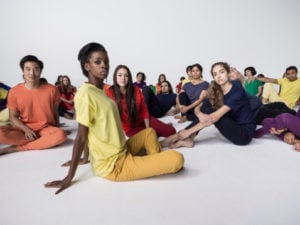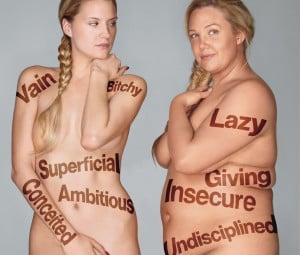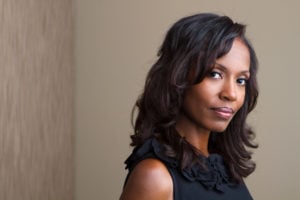Author’s Note: I realize that children with physical and cognitive disabilities run the gamut of ability and function. It is not my intention to categorize all children with disabilities as one thing or another or to juxtapose them against each other. My sole goal is to simply advocate for the fair, equal, and just treatment of children with disabilities. It is my professional and personal belief that most children are capable, if given the chance.
Two words: disabled and disable.
One the root word, one a derivative of the other, but starkly different in the context of their meanings.
My daughter Emory is disabled, meaning she’s somewhat limited in physical ability due to having a rare form of cerebral palsy. Our friend Bentley is also disabled, and he’s somewhat limited in an intellectual capacity due to having Down syndrome.
This word, disabled, describes a part of their life, a part of their identity, if you will, but it doesn’t define the entirety of who they are.
The word disable, the root word, is the act of physically hindering someone’s intellect or physical accessibility to the world around them.
Though both Bentley and Emory are disabled, the world at large is constantly attempting to disable them by not creating accessible infrastructures; by interacting with them through narrow, archaic stereotypes of disabled people; and by not granting them one simple liberty – self-determination.
Now, I’m not a negative Nelly. I believe that people inherently mean well.
This is wrong, and inadvertently begins the process of hindering unique potential.
We all do this in one way or another. It’s ableist. And if I’m honest with you, I’ve been guilty of this thinking at times, too.
My daughter, Emory, is in the second grade, utilizes a wheelchair, a walker, a communication device, and a weighted cuff to help with writing and art projects. By definition, she’s classically disabled – in the physical sense.
She understands English, some Spanish, American Sign Language, has a photographic memory, and can do complex math problems in her head.
Remember our friend Bentley? He’s capable of building amazing architectural sculptures using magnetic tiles, and spaghetti towers that balance marshmallows.
Emory takes ballet classes and lip syncs to every Adele song there is. She loves to play board games, jump rope, freeze tag, go bike riding, and fly around the skating rink with her friends at her side.
Bentley is an avid outdoors person – already going on long hikes with his family, discovering and pondering nature all around him.
But what if I had never followed Emory’s lead when she flipped her hand back and forth while watching Beyoncé’s “Single Ladies” video? What if Bentley’s mom never took notice of his love of nature when he explored his backyard for hours on end?
If we had allowed society to inform how we parent our children, Emory and Bentley would never know the richness of the potential that lies within them.
They wouldn’t have the full understanding of what it means to “try, try, and try again,” and they would miss out on the best part of childhood – understanding that the world is theirs to explore.
While I’m not disabled, I’m the parent of a disabled child, and I see the world trying to disable her on a daily basis (whether they mean to or not).
It’s my job, as her parent, to prepare her for the world by allowing her to experience it and to prepare the world for the firecracker I’ll one day unleash on it.
What I’m saying is that even though someone is disabled, it would behoove us to not marginalize them further by making assumptions about what they can or can’t do, how they do or don’t want to live their day-to-day lives, based on stereotypes and assumptions.
Further, the world around us is poised to disable my daughter, by default.
Statistically speaking, girls are less challenged academically, and they’re held to different social standards. Different a/genders get passes on different things in life. If you add in the presence of a disability, the landscape shifts dramatically.
Disabled children (physical, cognitive, or intellectual) are rarely academically challenged, nor are they expected to adhere to everyday societal norms and mores.
It’s fiercely important that educators (as well as parents) be aware of not only their unspoken (albeit understandable) academic and social biases towards disabled children, but also the incredible abilities of these children.
This understanding is key in not only correcting these biases, but also empowering the students in their care, namely female students, to rise to challenges placed before them.
Here are four things you can do right now to move from disabling my child (and any other child you may meet) to empowering her to greatness.
1. Put Her in the Game
My daughter’s body may look different from that of the average seven-year-old.
She’s 29 pounds. She uses a wheelchair. When she uses her walker, she’s harnessed in, and her little legs fly like she’s driving a Flintstone car in Bedrock. Her left leg is shorter than her right, and her left arm isn’t fully functional.
But believe me when I tell you that none of these things have ever stopped her from experiencing the joy of childhood. When it’s time to jump rope, she holds the rope in her right hand, and her friends help her turn it. She slays at freeze tag.
You see – she’s base. All of her friends have to come running to her to be safe, and she loves it. She calls her friends home, and her friends know she’s safe.
See what’s happening there? Her friends know she’s safe. Clever, right?
However, her friends would never know this, and she would never have these experiences if I hadn’t demanded that she be treated as just another child in class, and her teachers hadn’t put her in the game.
Her kindergarten teacher did it. Her first grade teacher did it. Her second grade teacher does it. But it started with me saying “She’s a child first – treat her as such.”
You’ll never know what my daughter can do, or any child with a disability can do, if you don’t provide the space for them to do it.
Sometimes we have this fear of hurting the kiddos, or the other kiddos being mean. But what if we just put them in the game and let kids do what kids do – play? Would typically able kids pair up with Bentley and be their own team? Most likely.
Children will never get a chance to display their humanity if they aren’t presented with the opportunities.
When you put my daughter in the game, everyone wins.
2. Is the Problem Behavior Yours – Or Theirs?
If your child is of color, has a disability, and is poor, the behavior is written off as “normal” or “over-scrutinized, and all interventions are abandoned.
We treat the disability as the cause of all the behaviors, which allows us to silence their oppression with ableism. So are we the ones with the problem behavior, or the children?
Last year, I came to the sobering conclusion that my daughter realized she was different from her peers. Up to this point, she had always seen herself as just another child in class – something I had worked very hard to foster for her.
Then, one day, she began refusing to work with her class aides. She started hitting them and throwing her communication device to the ground.
This behavior was atypical for my daughter. She’s the happiest, sweetest girl you’ll ever meet, and it was for this reason that my husband realized she was trying to tell us something.
He asked her a series of questions and came to the conclusion that she was sad at school because she was the only person in class with an aide. None of the other children had one, and she wanted the opportunity to do the work on her own and ask for help only if she needed it.
Like the other kids.
She wanted the opportunity to be empowered, and independent, and responsible for her academic success. She saw her friends and classmates being able to determine when and how they needed assistance, and realized she wasn’t being afforded that luxury.
She couldn’t put words to it, but I think in her own little way, she inherently understood that she wasn’t getting a fair shake, and her personal growth was at stake.
My girl wasn’t having it.
We relayed this information to her school, and a plan was devised that would put her in control of getting the help she needed. We haven’t had an issue with hitting or refusing to do classwork since then, and here’s what it taught us.
If we had just asked her about the emotions behind her behavior first, instead of just responding to her behavior with ours, we could have helped her much sooner.
Sometimes, there is an “I” in team – as in, “I know what I need, and if you’d listen to me, you’ll know, too.” At the age of six, my daughter was empowering herself when no one else would.
But what about the kids who are unlike my daughter? What about Bentley, who doesn’t have a physical disability, but a cognitive/intellectual one? Does he deserve to be independent, empowered, and responsible for his academic success?
The answer is yes.
Regardless of how our babies get through this life, they come into this life as humans. And for that reason alone, the answer is and should always be yes!
3. Follow the Leader(s)
Kids ask curious questions. They also give really blunt, to the point, obvious answers.
For example, last month, I had lunch at school with my daughter and her little squad of girlfriends.
One of the boys at the table began to ask some questions that were insensitive in nature, but to be expected of a child in second grade. Questions like: “Will she always be sick? Will she ever be normal? Will she talk?”
With each question, before I could even think up a child-appropriate response that didn’t involve rolling my eyes, sucking my teeth, and a four-letter word, her best friend answered (with perfect second grade sass): “Um, she’s not sick. She doesn’t have a temperature or a cold, but if she did, she takes medicine. Just like you and me.”
But her friend wasn’t done, “What do you mean ‘will she ever be normal?’ She’s totally normal. What are you talking about? If you listened, you’d hear her talking all the time. She has tons of words. You just have to liiiiiiisteeeeeeeennnnnn.”
And just like that, it was done.
I followed her best friends’ lead, and followed up with “What she said.” Should I have said more? Yes. I will own that. I missed a completely teachable moment about “normal,” and how obscure “normal” really is.
But, in my defense, I was so taken aback by the fierceness of this second grade dynamo that I was basically speechless. She said all the things I wanted to say, in a way that only a second grader can say and comprehend.
So yes, that’s my fault, but I stand firm in this rule – follow the leader(s) – sometimes they know more than we do.
4. Disability (And Cuteness) Doesn’t Negate Discipline
Let’s be real – my child has cuteness on lock.
What’s’ worse is that she knows it, and it’ll be your kryptonite if you let it.
You can’t let it. You also can’t let the fact that she has a disability negate and override any expectations of socially acceptable behavior, or manners.
If my child is doing something she knows she has no business doing, I fully expect you to correct her and impose the appropriate consequence. If you have ruled out any underlying emotions (see point #2), and she’s still acting out, there are consequences for that behavior.
We employ time outs, removal from environments, and loss of privilege and reward in our home. Employ this in school. You do this for the typically able children. You should do it for my Emory. You should do it for Bentley.
It’s key that my child understands (just as all kids are expected to understand) that just as we have expectations of her at home, there are expectations she has to rise to at school.
This will carry through the rest of her life and benefit her when she enters the workforce.
Yes. My child is entering the workforce when she’s sixteen. Bentley will too, and you’re going to help them get ready for it.
Now before you admonish me with “Well, your child doesn’t have cognitive delays, only physical and speech delays,” yes, you’re right. But even children with cognitive delays are capable of understanding.
The question is: Are you capable of learning and teaching on a level they are capable of understanding? Just like I expect you to hold my child accountable, you should expect me to hold you accountable.
We are a team, and I’m the captain. Although more often than not. my seven-year-old thinks she is. And let’s face it – she basically is.
***
Look, I get it. Dealing with kids is challenging enough.
You throw in disability, and it can be downright overwhelming. There have been plenty (plenty) of nights I have walked away from the homework table in frustration, only to come back fifteen minutes later (after a glass or three of wine), ready to try again.
We’re doing the homework. I’m following her lead. I’m checking my behavior – and if it calls for it, hers, too.
I’ve done a lot of thinking, learning, and failing in my seven-and-a-half years of being her mom, and what I’ve learned is this: If we’re going to give all children a chance in this world, it’s crucial that we adjust our gaze to hold children with disabilities (physical and otherwise) and typically able children in the same plane of view.
Their futures depend on it.
[do_widget id=’text-101′]
Adiba Nelson is a Contributing Writer at Everyday Feminism. She’s an author of the children’s book Meet ClaraBelle Blue, and a columnist with her local paper, Tucson Weekly. She is staunchly committed to social justice, disability rights, size acceptance/body autonomy, pizza, and Chubby Hubby ice cream – in no particular order.
Search our 3000+ articles!
Read our articles about:
Our online racial justice training
Used by hundreds of universities, non-profits, and businesses.
Click to learn more
Most Read Articles
- « Previous
- 1
- …
- 30
- 31
- 32


